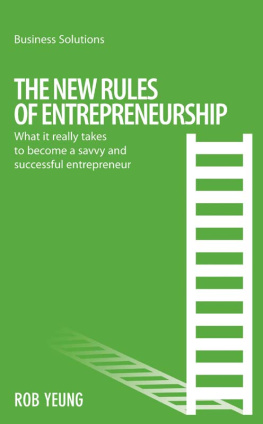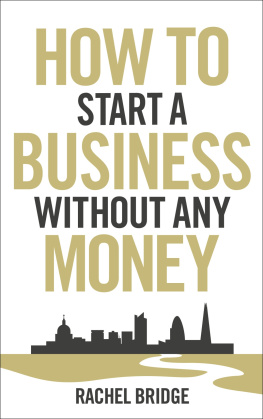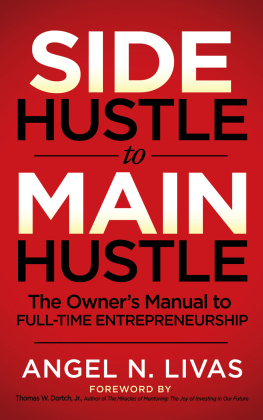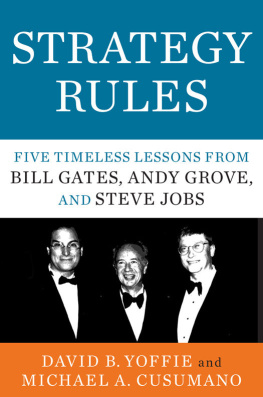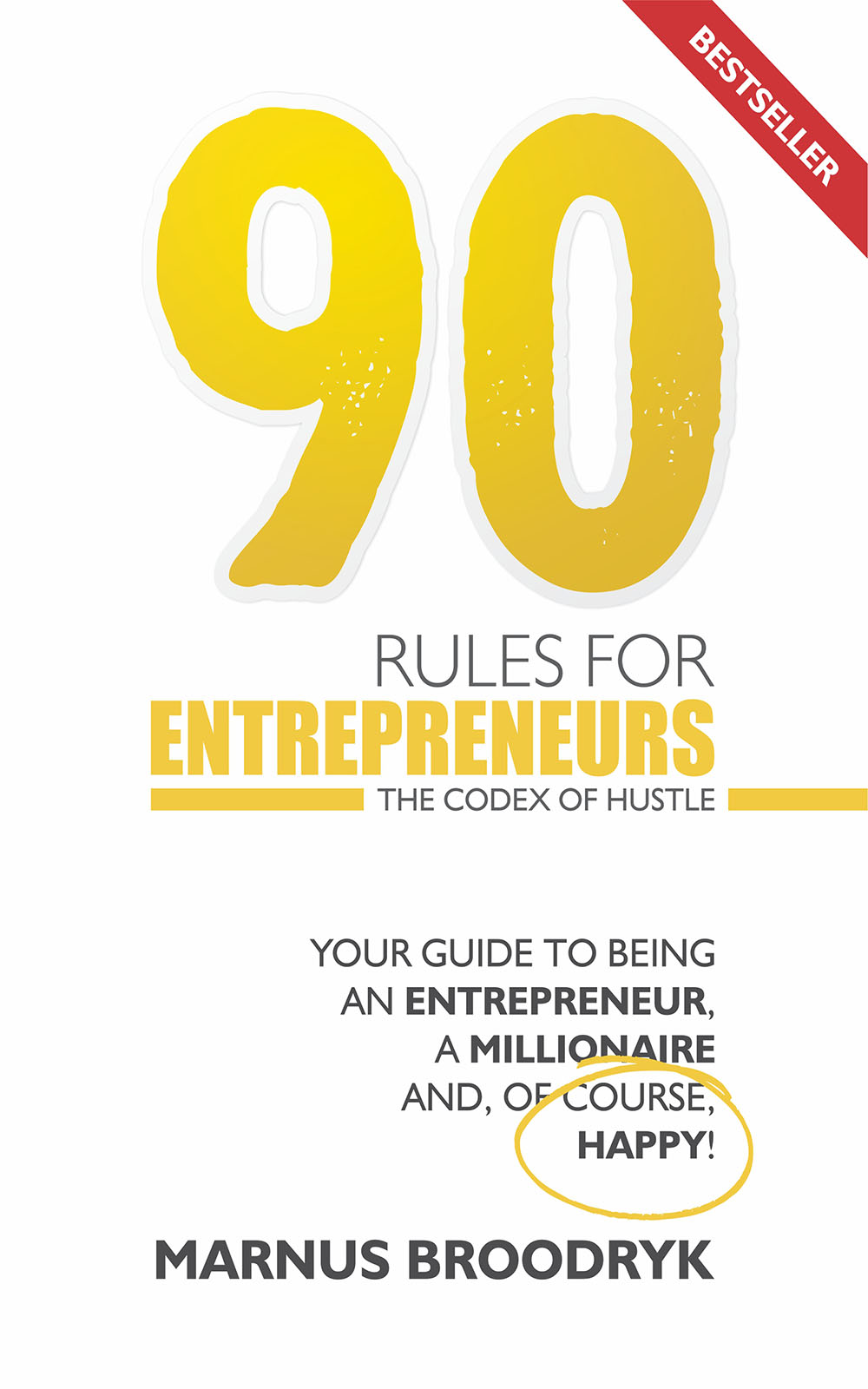A LITTLE SOMETHING TO THANK YOU FOR BUYING MY BOOK
I would love to connect with you before you even start reading this book.
Please head over to www.marnusbroodryk.com/90rules and register your details.
In return you will:
Get 5 exclusive emails with special content reserved only for readers who registered videos, behind the scene interviews and special deals on great products.
Have access to my weekly email with 5 bullet points of value to help you start, grow or manage your business. It is short and powerful and will add real value.
Have access to products (seminars, books, T-shirts) and events that I share exclusively with readers who register.
Lets also get social on the following platforms:
Facebook: Marnusbiz
Instagram: marnusbroodryk
Twitter: marnusbroodryk
Official hashtag: #90RulesBook
DONT GO BROKE TRYING TO LOOK RICH
Some very insightful person once said, Entrepreneurship is living a few years of your life like most people wont, so that you can spend the rest of your life like most people cant. I like to repeat it because its that relevant a reminder.
The time referred to is what you need to put in to make things work, and the sacrifices you will need to make, but it is equally true when considering your own personal expenses and lifestyle.
People often exit corporate life and start their own businesses thinking they can maintain their lavish lifestyles. In rare cases this can be done but, in most cases, it just isnt possible. A new business will take a lot from you and initially that might also mean all the cash available. Cut back on your own lifestyle to get your business off the ground.
There is nothing worse for a new entrepreneur than to be continuously running out of funds because of unnecessary personal expenses. Growing and funding the business is already hard enough; there is definitely no space to fund you as well. You need to ask yourself a question: Do I spend like Im already a millionaire, or do I dedicate all my focus and resources into ensuring I become a millionaire?
New entrepreneurs are often under pressure to show off. You started your own business and now you want to show the world how successful you are to justify your initial decision. To prove to your old boss that youve made it, to convince your friends that the missed beers and birthdays paid off. So you buy fancy cars, new laptops every month and slick suits and commit to other unnecessary personal expenses. And before you know it, youve outspent yourself. If you have investors in your business, you will soon piss them off because all the businesss cash flow goes into funding your own Rich and Famous Lifestyle. And when the business finally runs out of cash, you will find it impossible to convince them to give you any more. Its a slippery slope, all the way down to Broketown.
Taken all round, it is just bad business, but it is even worse for the entrepreneur still trying to make it. So dont fall for this. Rather take a back seat, see how you can scale down on personal expenses and put all your efforts and cash into the business. Dont live off finance and loans it is expensive. Live just behind your means. Cut back, get things going and once you have it all worked out you will have an amazing life with excess cash that you can spend on the good things in life.
Then. Not now.
Would you rather act like a millionaire, or be one?
UNDERSTANDING THE VALUATION IDIOM
There is so much BS going around when it comes to business valuations and what entrepreneurs can expect when selling their businesses, and one half of it contradicts the other half. The tech industry created a perception that if you have an idea half executed, you can sell it for billions but, in anything other than extreme cases, this is about as far from reality as you can get without going over the edge of the world
Although there are many factors to be considered when putting a valuation on a business, it will mostly be determined by your profit. There are exceptions, again especially in the tech industry, where intellectual property (IP) and number of customers are more important, but only because the IP and customers will contribute substantially to that profit in the future. Numbers are everything.
Like anything economic, the actual sale of a business depends on two parties: a willing buyer and a willing seller. These two parties need to meet halfway and both need to be happy with a valuation. Sometimes sellers are lucky, they get the right buyer willing to pay a premium price; most times they are not lucky. In fact, more often than not its only the buyer who walks away whistling.
When trying to sell a business in its startup phase, before it has made any profit, it is almost impossible to have a template for a valuation. The seller needs to work on assumptions and sketch a picture of how the business will look when it is successful, and the buyer needs to buy into this plan. There is really no formula; it is completely subjective.
When it comes to more established businesses, it is much easier to calculate a valuation. For this, many entrepreneurs often go to accountants who will apply some proprietary algorithm and come back with a ridiculously unrealistic amount. They completely ignore what price the market is willing to pay for said business.
Let me drop some simple knowledge: the average small business in South Africa can expect to get a valuation of around three times their annual profit (also referred to as a PE of 3). So, if the business is making R1 million per year, the average valuation will be around R3 million. There are exceptions, but this would be the average in most industries.
As businesses get bigger, this number will increase the average PE of JSE listed companies in South Africa is currently sitting on 17.
As a seller, your expectations should be grounded in reality value, as well as market sentiment. But remember what it is youre getting rid of, and make sure its worth it, regardless of what your accountant tells you.
Make sure your business is worth its value, regardless of what your accountant tells you.
10 MINI-RULES
BY ROMEO KUMALO
Before founding investment enterprise group Washirika Holdings, Romeo was the COO of Vodacom. Hes a venture capitalist, has been involved with more boards than a surfing shop and was a Shark on Shark Tank South Africa, which was where we first met. He is honestly one of the nicest people in the world ask anyone. But being nice doesnt make him any less worthy of respect in this space: these are his 10 mini-rules for entrepreneurs.
Dont take yourself too seriously
Life is already serious enough. It is imperative to have some fun along the way in order to lighten the journey towards success. If you believe in yourself, and your abilities, then success will follow, so there is no need to be serious all the time.
Surround yourself with people who are better than you, people who are masters in their field
As an entrepreneur you dont have to know everything about all things. You will be more successful if you surround yourself with people who know everything that you dont know. Surround yourself with good people who can help you succeed and whose skills and way of doing business you admire.
Live a life (and do business) of purpose and meaning
Live life according to your beliefs and values and do business that resonates with the same set of beliefs and values. Strive always to leave the world in a better condition than you found it. Always aim to give back to the community, invest in others, share your knowledge and help others grow.


